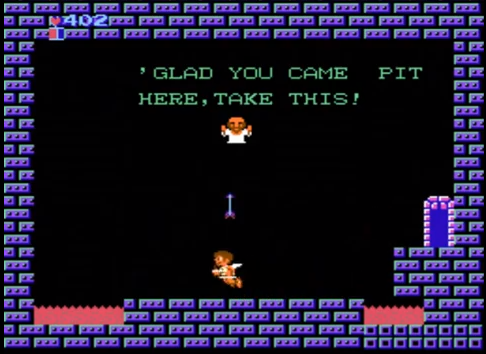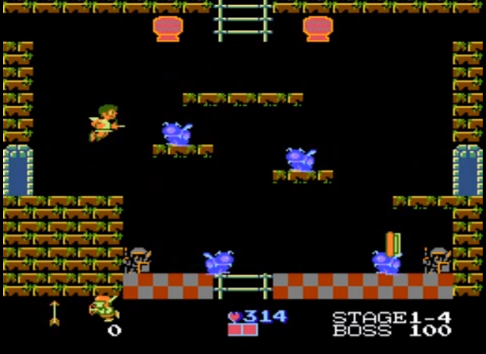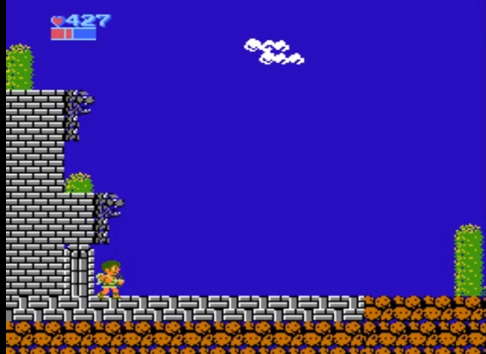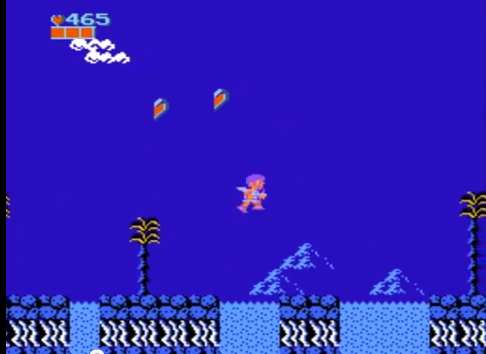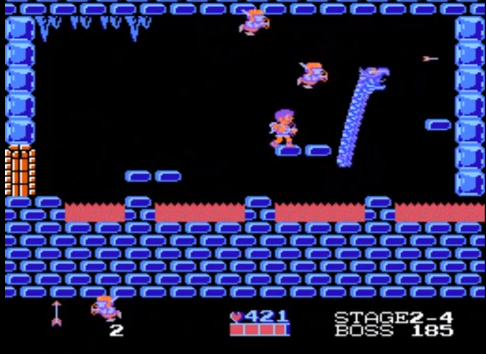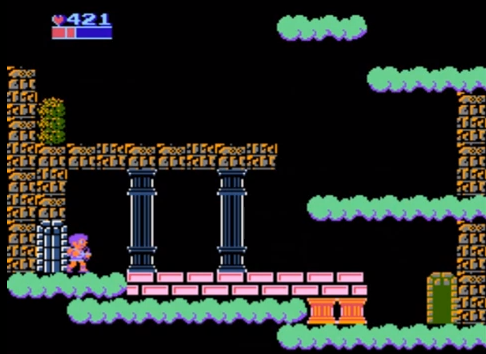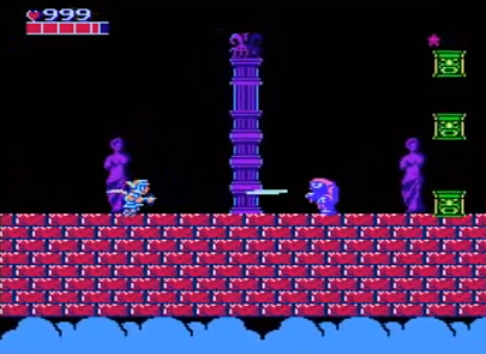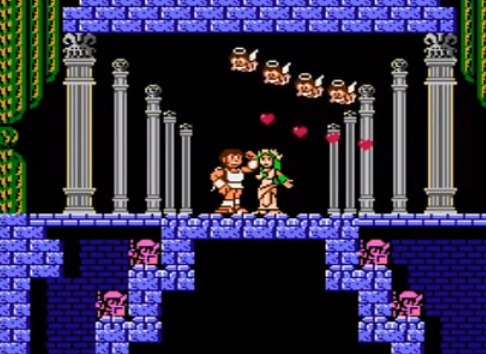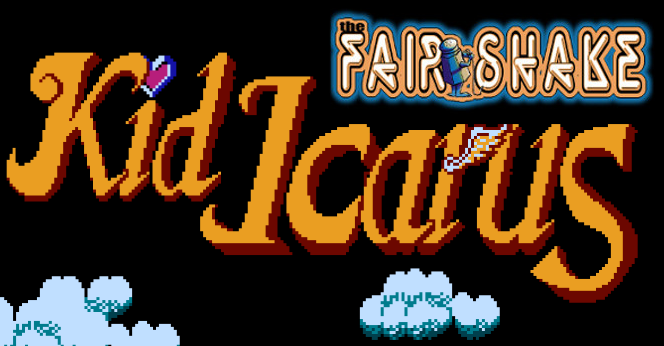
The Fair Shake
Kid Icarus
Paul, the usual author in this space, is absent this week, leaving me, Eric Bailey, to fill in for him. This is a tall order, and I am honored to borrow Carl for the noble purpose of giving a game The Fair Shake treatment. However, in respect to the usual great work done in this column, my pick is not exactly the standard fare you may consider here. No, I did not choose an obscure game, nor something found on a very hard-to-find console. I picked Kid Icarus, a classic title for the 8-bit Nintendo Entertainment System.
Why Kid Icarus? Why pick such a well-known, arguably rather iconic title? Why choose such a widely recognized property, possibly among Nintendo’s flagship franchises? How can this be a viable candidate for The Fair Shake column, a feature that has put a spotlight on games like Round 42 and Star Fleet 1: The War Begins?
This is why: There are many gamers out there who need to give Kid Icarus a Fair Shake.
You heard me. I truly believe this is among the most misunderstood video game cartridges ever, even among people who would concede that it is somewhere on the “legendary” scale. Full disclosure: I wrote a blog post about this game when I chose it as my 200th NES review. In the resulting conversations on Facebook and even through email, I had the pleasure of discussing the game with fellow retro gamers. And, to confirm my suspicion, it turns out that many people really, really dislike Kid Icarus.
Why?
Why do people hate this game? How can you dislike Pit so much? It turns out that, honestly, in my informal exchanges surrounding this game, there seem to rise a few common reasons: Kid Icarus is hard, Kid Icarus is weird, and Kid Icarus is annoying. I would like to spend a little time examining each of these arguments and, even if not writing an entire essay, somewhat deconstruct them.
Kid Icarus is hard. Okay, yes, I admit: Kid Icarus is, indeed, a challenge of great proportions. We have to look at two factors when identifying whether this is a valid argument, though: Does difficulty itself make a game bad, and is that punishing difficulty justified or merely achieved through “cheap” means?
I have to passionately contend that difficulty, itself, cannot make a game bad, simply because there are so many counter-examples to this idea. Even on the NES alone, horrifically hard games like Battletoads, Contra, and the Ninja Gaiden series are still, to this day, lauded for their gameplay quality, replay value, and overall contribution to their respective genre styles. If a game is too easy, it is neither fulfilling nor rewarding. If it is too difficult, though, that can certainly be an off-putting trait. So how does Kid Icarus achieve its difficulty level?
I believe Kid Icarus suffers from “Sewer Level Syndrome.” True NES fans may know where I am going with this: The original Teenage Mutant Ninja Turtles game on NES had a certain level that involved navigating a tight underwater passageway under a strict time limit in order to disarm a number of bombs while avoiding touching electrocuting seaweed. This stage is utterly notorious for being ridiculously annoying, taking a while to get used to, and being responsible for many rage quits.
What does this have to do with Kid Icarus? Icarus is one of those rare video games that starts out at its hardest, and gets easier throughout. This is true: Pit begins as a very weak character, with little health and miniscule firepower. Getting through the first couple stages is an arduous task. I think many people try it, get turned off by it, and never give Kid Icarus a fair chance. Because, honestly, once you get past the first fortress or so, there is a fantastic and epic adventure to be had here. Give it a fair chance; or, rather, The Fair Shake.
Besides, unlike a game like Adventures of Bayou Billy, Kid Icarus at least has a password system. Old-school players like me love the feeling of gradually earning our way forward, jotting down the coded marker than represents our progress, and being able to return to it later. This flexibility in timing lends forward movement a certain beauty in Kid Icarus, in that you can take your time and always come back later to continue.
Kid Icarus is weird. Well, okay, sure, I can concede that, to an extent. This is an unusual game, with portions that scroll horizontally, portions that scroll vertically, parts that proceed more like a room-by-room adventure dungeon ala Legend of Zelda, a shoot-’em-up part, bizarre enemies like abominable snowmen and suspicious Metroid rip-offs, strange shopkeepers, odd items like a credit card, and a strange misshapen version of Greek mythology.
But is this really so bad? Are people who are turned off by the weirdness of this game so intolerant towards, say, people? Do you immediately discount a person’s worth because they strike you as a little off? Maybe that is a harsh example, but considering that a game like Super Mario Bros involves mushroom power-ups and the compulsion to kill all turtles, perhaps Kid Icarus is not so strange by comparison. Even if it was, however, I would argue that this only adds to its charm and distinctiveness. If you like your video games to be generic and not stand out, fine, but some of us can definitely appreciate flourishes like empty rooms and laughable ending options and the infamous eggplant wizards, which will bring us to our final point.
Kid Icarus is annoying. This may seem like the first argument rehashed, but alas, the annoyances cited in Kid Icarus are their own creature completely. From being turned into an eggplant to the arcane font used for the passwords, many retro players sigh at the mention of Kid Icarus and begin recounting these horrors, like the quirky map system used in the castle stages.
This might be the most legitimate complaint. After all, there are some video games you can point to that do not really have any frustrating bits, which adds to their appeal. Icarus is a beast with a few unpleasant fangs that cannot be simply chalked up as adding to its delightful nature.
But, still: There are hospital rooms to recover from the eggplant curse. Writing a password down incorrectly is not truly the fault of the game. And a true retro warrior can hardly complain of a faulty map mechanic when we used to have to hand-draw our own maps for games; and, frankly, very much enjoyed the endeavor, which added a whole new dimension to gameplay.
Basically, these “annoyances” are really just excuses. Flimsy, thin reasonings given for disliking Kid Icarus. Look, I can acknowledge with full conviction that this, like any other video game, is something that is not for everyone. You can try it and, with a clear conscience, end up disliking it. All I ask is that you give Kid Icarus an earnest try. Get past those first couple levels. Master the fine art of knowing when to jump and fire, or when to just shoot straight upward. Earn more items for Pit. Revel in the bizarrely backwards economy that uses hearts for currency.
Give Kid Icarus The Fair Shake.
